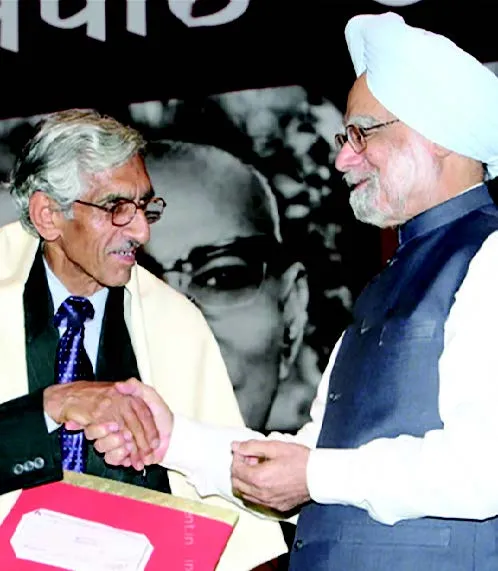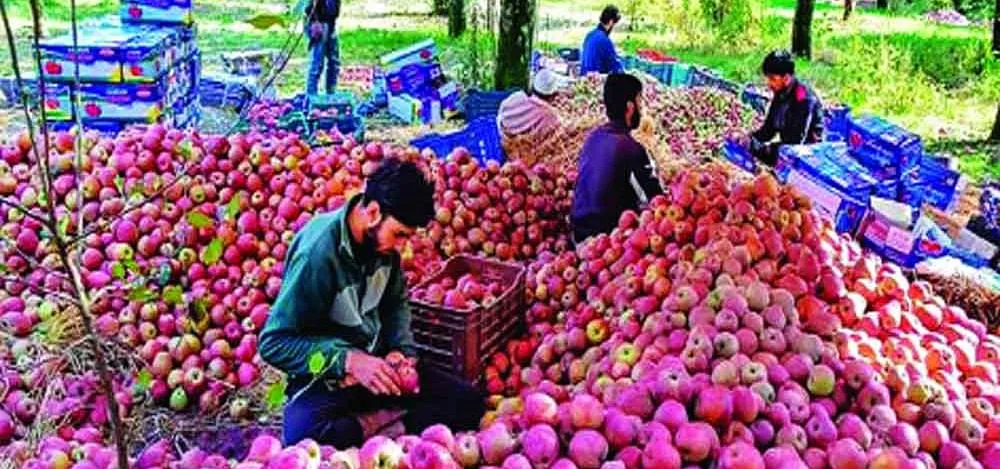BY SHEIKH MANZOOR AHMED
Prof Rehman Rahi, a poet extraordinaire, whose poetry left an everlasting impact on Kashmiri literature died in Srinagar early this morning after a brief illness.
The celebrated litterateur, who was conferred the highest literary award-Jnanpith-for introducing modernist ideas and views in literature, belonged to a league of great poets who made immense contributions to the development of new thought processes in Kashmir poetry.
Prof Rehman Rahi, 98 was spending a forlorn life after the death of his spouse a few years back, and it left a deep impact on his health. He remained confined to his home but glorified in the calm of his solitary life.
Even tough he became frail and weak due to his advanced age, a spark of poetic genius kindled in him. He needed a stick for support.
For Prof Rahi old age provided strength and he had shown the will to overcome all kinds of vicissitudes and illnesses. However, he remained disconnected from his literary friend circle and only a few of them visited him to know his well-being.
He virtually isolated himself.
While presenting him Jnanpith Award at a glittering ceremony in the Indian capital in 2008, former Prime Minister Dr Manmohan Singh described Prof Rafi as one of the pioneers of the modernist movement in literature and acknowledged his immense contribution to the growth of Indian literature.
He introduced ”stream of consciousness” as a narrative device and mode in his poems.
”Qaar Darya Salsabeel” poem is an effort by this great poet to depict a multitude of thoughts and feelings that pass through the mind of a human being. This presents events of everyday life of common men through the flow of thought like a stream.

Being a student of English literature, Rahi appeared to have got greatly influenced by T S Eliot, Virginia Woolf and James Joyce.
Before Prof Rahi entire Kashmiri poetry was just describing romance, folklore and mysticism, but he enlarged the canvas of Kashmiri literature by portraying social changes in the society.
The academia of the highest order reflects social oppresion in his writings and poems.
Rahi remained associated with the progressive movement and his famous poem “Zindi Rozna Baapat” depicts the despair and sadness of Kashmiri migrant workers in different lands.
These are bodies with
soul and definition and shadows without color.
It shows how Kashmiris work hard in other parts of the country to earn their livelihood. It was probably in early 1950s when Rahi was in Amristar and saw a group of Kashmir laborers toiling hard under the scorching sun to earn their livelihood.
This has left a deep impact in his mind and got reflected in this beautiful heart-rending Poem Zinde Roozne Bapat Chou Cze Maroun (you have to die a hundred deaths for survival).
Sahitya Akademi awardee’s poetic work also reflects high romance in revealing his inner thoughts and desire to have a reunion with his beloved. His romantic poetry shows sleepless nights of lovers longing for lovemaking. But it is to feed the soul and the mind and to fill a void that is there for a long time.
“Rang Czetna Maeni Jawani Sou Jaaeni Yaar Yeehayem”.
Here he reflects on the exciting, but intense feeling of a lover showing how hard it is for her to wait for the beloved. It is agonizing for her to wait.The lovelorn woman is longing for the moment when he can meet her lover and whisper in his ears as how much she missed him. Waiting is a sign of true love .
The excitement of reunion was so intense that she threw herself in lover’s arms demonstrating her passion and emotions.
“There was nothing else for them but the yearning to remain close to each other for life. They became two souls in one body and their restlessness and agony ended in the merger of their souls”.
Rahi is also a nature lover and some of his works depicted the beauty of the nature. Some critics describe Prof Rahi as a poet of silence because he remained aloof from politics, but in his latest collections, he voiced the pain and agony of the people, which they had to undergo in the past thirty years due to political turmoil and unrest.
”Khabar sou Vyeth cha Venni ti Wassan” (whether jhelum still flows) draws a brilliant description of the prevailing the situation in the valley, which consumed the lives of thousands and wiped out a generation. He is truely a poet of Kashmiriyat, who voiced the pain and agony of the people.
Prof Rahi, is aptly regarded as one of the greatest Kashmiri poet of the 20th century. He is the author of more than a dozen books, including the poetic collection “Farmove Zartushtan” – became the youngest Indian to win the Sahitya Akademi award in 1961. In 1999, he was honored with the Padmashri and Jnanpith Award in 2008.
Rahi began his career as a government clerk and was associated with the Progressive Writers’ Association, of which he later became the general secretary. He was a sub-editor with an Urdu daily in Kashmir before he joined the University of Kashmir, from where he retired as a Head of the Kashmir Department in 1983.
Even though I used to know him from childhood days as we were living in the same vicinity but developed a close rapport with him when he was entrusted job of establishing the Kashmiri department in Kashmir University and was made its head.
At that time I used to spend a lot of time with students of the first batch of Kashmir department. I also joined the second batch of diploma course that brought me closer to him. I could ‘not get benefited by his scholarly qualities and vast knowledge of literature.
However, Prof Shafi Shauq, Mrs Naseema Shafia, Bashir Basher, and Iqbal Fahim, Prof Shaad Ramzan and several others carried his legacy and earned name and fame in Kashmiri literature.
Prof Rahi’s communicative skills and expression are unparalleled and his vocabulary is awesome and versatile. He used to keep listeners spellbound and even a dull and boring student like me used to get mesmerized by his speech deliver.
Prof Rahi often invited great scholars like Late Mohiuddin Hajni, Historian Bamzai, and Yousaf Teng for special lectures to help students to enrich their knowledge in Kashmiri history, literature, mysticism, and culture.
Sheikh Manzoor Ahmed, former Editor of UNI , also served as Associate Editor/ Bureau Chief of Greater Kashmir in Delhi.
DISCLAIMER: The views and opinions expressed in this article are the personal opinions of the author.
The facts, analysis, assumptions and perspective appearing in the article do not reflect the views of GK.






